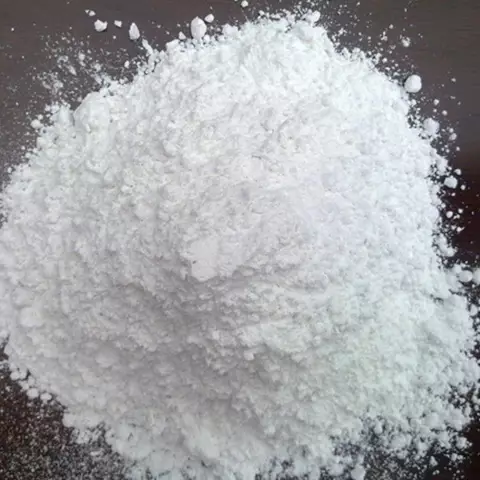- Author Rachel Wainwright wainwright@abchealthonline.com.
- Public 2023-12-15 07:39.
- Last modified 2025-11-02 20:14.
Sesame
Sesame is an annual thermophilic herb from the sesame family, numbering more than thirty species, most of which are wild. Sesame grows mainly in the tropical and subtropical zones of Africa. According to many historical sources, sesame is one of the first plants that humans cultivated a few thousand years ago.
The ratio of BJU in the product

Source: depositphotos.com How to burn 573 kcal?
| Walking | 143 minutes |
| Jogging | 64 minutes |
| Swimming | 48 minutes |
| A bike | 82 minutes |
| Aerobics | 115 minutes |
| Household chores | 191 minutes |
It is believed that the most famous of the species - Indian sesame, got its name from the country in which it was first cultivated, since this species does not occur in the wild. It is grown in China, India, Korea, North America, as well as in southern Russia and the Caucasus.
Plant height varies from 50 to 100 cm. Sesame leaves are wide, and flowers can vary greatly in color depending on the variety - from white to purple. The fruit of the plant is an elongated capsule pressed against the stem, which, after the seeds ripen, opens, pouring them out. Therefore, sesame seeds, as a rule, are harvested a little underripe, after which they are dried in the sun.
Sesame has long been prized for its beneficial properties. In the countries of the East, it is now added to almost all dishes. It was believed that it is one of the components of the elixir of immortality, and in the treatises of Ancient India, sesame seeds were a symbol of immortality.
Useful properties of sesame seeds
Useful properties of sesame are determined by its composition:
- Ash;
- Cellulose;
- Macronutrients, among which most are calcium (468 mg per 100 g of seeds), as well as potassium, magnesium, phosphorus and sodium;
- Vitamins of group B, the leading place among which is taken by vitamin B4 (25.6 mg per 100 g of seeds), as well as vitamins A, C, E;
- Trace elements - iron, zinc, copper, selenium and manganese.
100 g of sesame seeds contain an average of 573 kcal.
The calcium found in the seeds is very well absorbed, and many call sesame the "king of calcium", because it is indispensable during the growth period, for the preservation of teeth, for fractures and injuries of the musculoskeletal system, as well as for the prevention of diseases caused by a lack of calcium in the body …
Another of the health benefits of sesame is that the seeds are powerful antioxidants. This makes them a powerful therapeutic and prophylactic agent in the fight against premature aging and cancer.
The benefits of sesame
With a number of medicinal properties, the benefits of sesame are noted in the treatment of diseases of various body systems.
So, with a disease of the respiratory system, sesame seeds, having an antispasmodic and anti-inflammatory effect, facilitate breathing with chronic cough, pneumonia, asthma and shortness of breath.
In the treatment of diseases of the digestive system such as constipation, gastritis, ulcerative colitis, dysentery, as well as in diseases of the pancreas, liver and gallbladder, sesame has a laxative, antitoxic and anthelmintic effect.
The benefits of sesame are noted for hemorrhoids, hypertension, bleeding gums, since it takes part in the synthesis of structural proteins and has an antispasmodic effect.
Sesame increases intelligence and strengthens memory, and in the treatment of diseases of the nervous system (migraine, neuralgia, dizziness), it has an antispasmodic and calming effect.
In addition, the benefits of sesame are proven in the treatment of:
- Urolithiasis;
- Osteoporosis, osteochondrosis, arthritis, arthrosis, scoliosis;
- Hemorrhagic diathesis, internal bleeding;
- Hyperfunction of the thyroid gland, diabetes mellitus, mastopathy.
Properties and uses of sesame oil
Sesame oil increases the number of platelets and accelerates blood clotting, which makes it possible to use it for the treatment of essential thrombopenia, thrombocytopenic purpura and hemorrhagic diathesis.
In addition, the oil neutralizes the increased acidity of gastric juice and blood acidity and helps to strengthen the body and increase muscle mass, which is often used in bodybuilding. It is also used in the form of enemas as a mild laxative.
Other beneficial properties of sesame oil include its ability to:
- Calm and relax muscles;
- Provide an analgesic effect for toothache;
- Prevent the development of osteoporosis;
- Improve lipid metabolism;
- Remove toxins from the body.
The oil obtained from sesame seeds is used in official medicine as the basis for the preparation of many fat-soluble injectable preparations. In addition, it is the basis for ointments, oil emulsions and patches.
Culinary and medicinal uses of sesame seeds
Sesame seeds go well with almost any food, and to enhance the flavor, they should be slightly calcined in a pan before adding to food.
Sesame is most often used in the confectionery industry, but it can be added to almost any dish - salads, cereals, soups, sushi, meat and fish dishes.
Sesame seeds are used in different ways to treat various diseases:
- When treating colds and flu, it is recommended to rub heated oil into the chest area;
- In case of indigestion, sesame seeds are ground with honey and taken three times a day, 1 teaspoon;
- For constipation, it is recommended to drink 0.5-1 teaspoon of sesame oil a day.
The use of sesame oil in cosmetology
Sesame seed oil is widely used in cosmetology due to its ability to:
- Remove toxins and metabolic products from the skin;
- Penetrate deep into the skin, soften and cleanse it;
- Reduce the harmful effects of sunlight on hair and skin;
- Rejuvenate the skin (due to antioxidant properties);
- Regulate the work of the sebaceous glands, as well as shrink and smooth pores;
- Heal and soothe skin and facial irritation;
- Protect hair and nails from harmful effects (due to antibacterial properties).

Harm from sesame
Sesame belongs to plants that have practically no contraindications. Harm from sesame seeds can occur only in case of individual plant intolerance, which can manifest itself in the form of minor allergic reactions. Most often, such allergic reactions occur in people who are allergic to foods such as rye, poppy seeds and various types of nuts (hazelnuts, cashews, pistachios).
In addition, with increased blood clotting and varicose veins, harm from sesame can occur in cases of abuse of seeds.
YouTube video related to the article:
Found a mistake in the text? Select it and press Ctrl + Enter.






